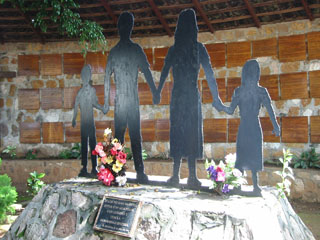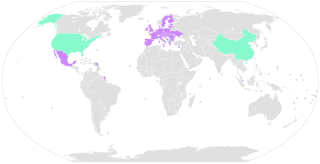
The Organization of American States is an international organization founded on April 30, 1948 to promote cooperation among its member states within the Americas. Headquartered in Washington, D.C., OAS is a "multilateral regional body focused on human rights, electoral oversight, social and economic development, and security in the Western Hemisphere," according to the Council on Foreign Relations. As of June 2023, 35 states in the Americas are OAS members. Since the 1990s, the organization has focused on election monitoring. Luis Almagro was inaugurated as OAS secretary general in 2015.
The Inter-American Commission on Human Rights is an autonomous organ of the Organization of American States (OAS).

The American Convention on Human Rights, also known as the Pact of San José, is an international human rights instrument. It was adopted by many countries in the Western Hemisphere in San José, Costa Rica, on 22 November 1969. It came into force after the eleventh instrument of ratification was deposited on 18 July 1978.

The Inter-American Court of Human Rights is an international court based in San José, Costa Rica. Together with the Inter-American Commission on Human Rights, it was formed by the American Convention on Human Rights, a human rights treaty ratified by members of the Organization of American States (OAS).

The terms international waters or transboundary waters apply where any of the following types of bodies of water transcend international boundaries: oceans, large marine ecosystems, enclosed or semi-enclosed regional seas and estuaries, rivers, lakes, groundwater systems (aquifers), and wetlands.

The Convention on the Recognition and Enforcement of Foreign Arbitral Awards, commonly known as the New York Convention, was adopted by a United Nations diplomatic conference on 10 June 1958 and entered into force on 7 June 1959. The Convention requires courts of contracting states to give effect to private agreements to arbitrate and to recognize and enforce arbitration awards made in other contracting states. Widely considered the foundational instrument for international arbitration, it applies to arbitrations that are not considered as domestic awards in the state where recognition and enforcement is sought.
In law, the enforcement of foreign judgments is the recognition and enforcement in one jurisdiction of judgments rendered in another ("foreign") jurisdiction. Foreign judgments may be recognized based on bilateral or multilateral treaties or understandings, or unilaterally without an express international agreement.

The Brussels Regime is a set of rules regulating which courts have jurisdiction in legal disputes of a civil or commercial nature between individuals resident in different member states of the European Union (EU) and the European Free Trade Association (EFTA). It has detailed rules assigning jurisdiction for the dispute to be heard and governs the recognition and enforcement of foreign judgments.
International arbitration is arbitration between companies or individuals in different states, usually by including a provision for future disputes in a contract.
An arbitration award is a determination on the merits by an arbitration tribunal in an arbitration, and is analogous to a judgment in a court of law. It is referred to as an 'award' even where all of the claimant's claims fail, or the award is of a non-monetary nature.

Despite being a founding member of the Organization of American States (OAS), Cuba was effectively suspended from 31 January 1962 to 3 June 2009. Thus, for almost the entire time that the OAS has been operating, Cuba has been barred from sending representatives to the OAS and effectively had its membership suspended. It was not until 3 June 2009 that foreign ministers of OAS member countries assembled for the OAS's 39th General Assembly in San Pedro Sula, Honduras, passed a vote to lift Cuba's suspension from the OAS.

Arbitration is a form of alternative dispute resolution (ADR) that resolves disputes outside the judiciary courts. The dispute will be decided by one or more persons, which renders the 'arbitration award'. An arbitration decision or award is legally binding on both sides and enforceable in the courts, unless all parties stipulate that the arbitration process and decision are non-binding.
Territorial disputes of Nicaragua include the territorial dispute with Colombia over the Archipelago de San Andres y Providencia and Quita Sueno Bank. Nicaragua also has a maritime boundary dispute with Honduras in the Caribbean Sea and a boundary dispute over the Rio San Juan with Costa Rica.

Justice Jean-Paul Beraudo is a lawyer, academic and author of legal works. He was Justice at the French Supreme Court and vice-chairman of the International Court of Arbitration. He lectures on International Private Law and International Trade Law at Panthéon-Sorbonne University and on Company law at Sciences-Po, Paris. The International Institute for the Unification of Private Law (UNIDROIT) appointed him correspondent for France and a member of the scientific committee.
Kiobel v. Royal Dutch Petroleum Co., 569 U.S. 108 (2013), was a United States Supreme Court decision in which the court found that the presumption against extraterritoriality applies to claims under the Alien Tort Claims Act. According to the Court's majority opinion, "it would reach too far to say that mere corporate presence suffices" to displace the presumption against extraterritoriality when all the alleged wrongful conduct takes place outside the United States.

The Hague choice of court convention, formally the Convention of 30 June 2005 on Choice of Court Agreements, is an international treaty concluded within the Hague Conference on Private International Law. It was concluded in 2005, and entered into force on 1 October 2015. The European Union, Denmark, Mexico, Singapore, Ukraine and the United Kingdom are parties to the convention. China, Israel, North Macedonia, Ukraine and the United States signed the convention, but did not ratify.

Philippines v. China, also known as the South China Sea Arbitration, was an arbitration case brought by the Republic of the Philippines against the People's Republic of China (PRC) under Annex VII of the United Nations Convention on the Law of the Sea concerning certain issues in the South China Sea, including the nine-dash line introduced by the mainland-based Republic of China since as early as 1947. A tribunal of arbitrators appointed the Permanent Court of Arbitration (PCA) as the registry for the proceedings.

The Hague Judgments Convention, formally the Convention of 2 July 2019 on the Recognition and Enforcement of Foreign Judgments in Civil or Commercial Matters is an international treaty concluded within the Hague Conference on Private International Law. It was concluded in 2019, and will enter into force on 1 September 2023 for the European Union and Ukraine. The convention governs the recognition of judgements in civil and commercial matters.

The Inter-American Convention on the Prevention, Punishment, and Eradication of Violence against Women, better known as the Belém do Pará Convention, is an international human rights instrument adopted by the Inter-American Commission of Women (CIM) of the Organization of American States (OAS) at a conference held in Belém do Pará, Brazil, on 9 June 1994. It is the first legally binding international treaty that criminalises all forms of violence against women, especially sexual violence. On 26 October 2004, the Follow-Up Mechanism (MESECVI) agency was established to ensure the State parties' compliance with the Convention.
The Second Inter-American Specialized Conference on Private International Law was an international conference on private international law held in Montevideo, Uruguay, from 23 April to 8 May 1979. Representatives from 20 member countries attended the conference, organized by the Organization of American States (OAS) with the goal of continuing the work done during the First Conference. By the end of the meetings, seven conventions and an additional protocol on private international law were approved.












